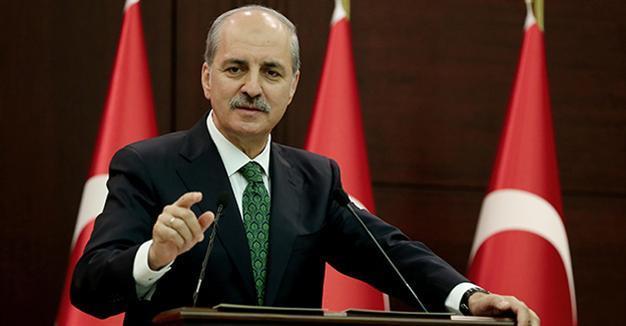Not all Syrian migrants to get citizenship, says Turkish gov’t
ANKARA

AA photo
Not all of Turkey’s nearly three million Syrian refugees will be offered citizenship, Deputy Prime Minister Numan Kurtulmuş told reporters on July 11, saying the aim is to offer Turkish IDs to qualified and educated Syrians “with a clean record.”
“Studies are being conducted on how those Syrians who can be of benefit Turkey, who have never been involved in acts of terror, and who could serve as a bridge between Turkey and Syria, could become Turkish citizens,” Kurtulmuş said at a press conference during a break in the weekly cabinet meeting.
“There are highly qualified people with important occupational abilities and vast knowledge among our Syrian brothers and sisters,” he added, underlining that the details of a planned citizenship scheme are yet to be fully worked out by the Interior Ministry, which is tasked with deciding on citizenship applications.
“As of now, our Interior Ministry has not yet completed its work on [offering] citizenship to Syrians,” Kurtulmuş said, stressing that concerted efforts are ongoing.
He was also asked about a bloody fight that erupted between Syrians and Turks in the Central Anatolian province of Konya on the night of July 9, which cost the lives of two people and wounded three others.
While describing the incident as “worrying,” Kurtulmuş suggested it was a “local incident” and could have been the result of a “provocation.”
“The incident in Konya is a worrying incident but I would like to repeat that such incidents may arise as a result of local [things], or provocations,” he added, stressing that he did not believe efforts to “trigger xenophobia and racism in Turkey” would ever succeed.
“One should evaluate this as a local incident,” Kurtulmuş said, praising the “distinction” of Turkish culture for being able to absorb three million refugees.
A lively debate over the possible granting of citizenship to Syrians commenced after President Recep Tayyip Erdoğan said on July 2 that the option is on the table.
“We will give a chance to [acquire] citizenship by helping out these brothers and sisters by monitoring through offices set up by the [Interior] Ministry,” Erdoğan said.
His statement sparked criticism from opposition parties, which accused him of trying to win political support by “manipulating refugees,” hoping to win support among a new section of the electorate.
Main opposition Republican People’s Party (CHP) Secretary General Kamil Okyay Sındır also slammed the ruling Justice and Development Party (AKP) for “discriminating” between refugees based on their skills and “treating refugees merely as someone to benefit from.”
The Nationalist Movement Party (MHP), on the other hand, described Erdoğan’s suggestion as “political populism” that would discourage Syrians from returning to Syria and in turn create voters for the ruling party.
Peoples’ Democratic Party (HDP) Kars Deputy Ayhan Bilgen warned that the policy could lead to a deepening of resentment and prejudice against Syrians.
Some social media users also launched an online campaign, with #suriyelilerehayir (“No to Syrians”), which became the top trending topic in Turkey on Twitter on July 9.
According to a recent report by daily Habertürk, Ankara aimed to grant Turkish citizenship to up to 300,000 Syrian refugees, as part of plans to keep wealthy and educated Syrians inside the country.
Nationality would be given step-by-step, with initial plans for 30,000 to 40,000 Syrians to be granted citizenship, Habertürk reported.
Turkey hopes such a move would allow skilled Syrian refugees to become citizens, while educated refugees from other countries could also opt to become Turkish nationals.
